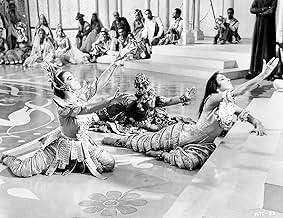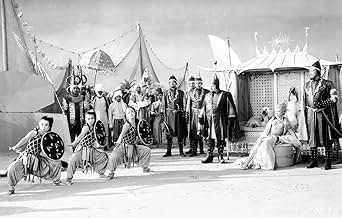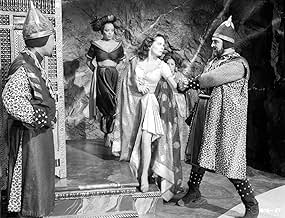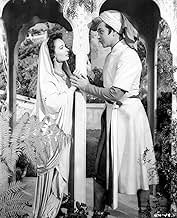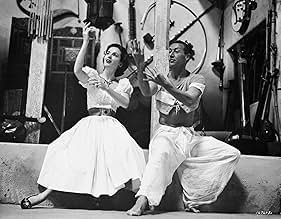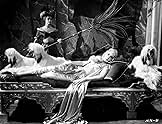NOTE IMDb
6,3/10
1,8 k
MA NOTE
Ajouter une intrigue dans votre langueA roguish poet is given the run of the scheming Wazir's harem while pretending to help him usurp the young caliph.A roguish poet is given the run of the scheming Wazir's harem while pretending to help him usurp the young caliph.A roguish poet is given the run of the scheming Wazir's harem while pretending to help him usurp the young caliph.
- Réalisation
- Scénario
- Casting principal
Ray Aghayan
- Brave Shopkeeper
- (non crédité)
Ed Agresti
- Nobleman
- (non crédité)
Richard Alameda
- Nobleman
- (non crédité)
Suzanne Ames
- Harem Showgirl
- (non crédité)
Jan Arvan
- Manservant
- (non crédité)
William Bagdad
- Wholesaler
- (non crédité)
Ross Bagdasarian
- Fevvol
- (non crédité)
Rama Bai
- Plump Ayah
- (non crédité)
Avis à la une
I saw this movie version and have always loved it. I also saw the stage version, but who could be better than Howard Keel. I felt like a "Stranger In Paradise." I have always been a movie musical buff and a big fan of Mr. Keel. When I first saw the movie as a child, I felt transported back to that time period (even if it was a Hollywood movie). The beautiful music and romance contained within makes you feel wonderful. And you can imagine all the romance, adventure and "Baubles, Bangles and Beads" you could ever wish for and all in the time and space of this lovely movie with beautiful music. Thank you Howard Keel, Ann Blyth, Vic Damone and company for one of my favorite movie memories.
Thanks to the mega surprise success of SEVEN BRIDES FOR SEVEN BROTHERS, and the income of $7m in rentals (wow!) MGM lurched into a series of 'robust' macho musicals: ATHENA, ROSE MARIE, HIT THE DECK, and the best of all: IT'S ALWAYS FAIR WEATHER. KISMET today, 50 years later, it is best enjoyed knowing it came from that mindset and is a product of a lavish budget itself: $2.6m. Like all those above it made money, but only just. In 2004 it is the production values and the music/dancing that is sensational and compared to modern film production quality is positively a masterpiece. I am sure even Madonna has seen this because the Market Place dance number is certainly recycled into her music video imagery. Dolores Gray is suitably brassy and the absolutely awesome NIGHT OF MY NIGHTS number with Vic Damone is one of the most visually enchanting set pieces committed to film ever. Try and see it in cinema scope, as pan/scan TV prints cut the sides off and the impressive visuals are crippled. It's quite rude too.
Given the times we're in and the changing public tastes in music, I'm not sure how well a revival of Kismet as a Broadway show would do today. Certainly the music of Alexander Borodin remains timeless, but a show with an Arabian Nights setting, I'm not sure would go over so well right now.
The Broadway show with Alfred Drake, Doretta Morrow, Richard Kiley, and Joan Diener ran for 583 performances in the 1953-54 season and won a Tony Award. As none of those worthy performers were movie names, Arthur Freed recast the film with MGM players Howard Keel, Ann Blyth, Vic Damone, and Dolores Gray and I've sure got no complaints about any one of them.
But Kismet has an older an more varied history. It was first presented on Broadway as a straight dramatic play in 1911, written by Edward Knoblauch and providing a career role as Hajj the beggar king for Otis Skinner. He must have done the role a gazillion times on Broadway and in touring companies.
Skinner even did two films, a silent and early sound version that I believe are both lost. It then got a film version with Ronald Colman as Hajj and it co-starred Marlene Dietrich, James Craig and Joy Page. Colman spoke the lines in the inimitable Colman fashion, but the music score that Harold Arlen and E.Y. Harburg wrote was singularly bland.
Nothing bland about the themes of Alexander Borodin which Robert Wright and Chet Forrest arranged and wrote lyrics for to provide a far better musical score. Two songs, Strangers In Paradise and Baubles Bangles And Beads were chart toppers in the first half of the Fifties. I well remember as a child hearing both played on the radio a lot.
The plot of the story centers around the nimble tongued Keel as Hajj who gets himself involved in palace politics with the Wazir/Prime Minister of the old Caliphate of Bagdad played by Sebastian Cabot and his wife Dolores Gray who's taken a real fancy to Keel. At the same time the Caliph on one of his nocturnal wanderings of legend has fallen for Keel's daughter Ann Blyth. The Caliph is played by Vic Damone. Both plot elements come together for an inevitable conclusion which I think you can figure out.
Vincente Minnelli did a great directing this old chestnut, impeccably cast with great musical performers. Songwriting because of who inspired it, doesn't get any better than this.
The Broadway show with Alfred Drake, Doretta Morrow, Richard Kiley, and Joan Diener ran for 583 performances in the 1953-54 season and won a Tony Award. As none of those worthy performers were movie names, Arthur Freed recast the film with MGM players Howard Keel, Ann Blyth, Vic Damone, and Dolores Gray and I've sure got no complaints about any one of them.
But Kismet has an older an more varied history. It was first presented on Broadway as a straight dramatic play in 1911, written by Edward Knoblauch and providing a career role as Hajj the beggar king for Otis Skinner. He must have done the role a gazillion times on Broadway and in touring companies.
Skinner even did two films, a silent and early sound version that I believe are both lost. It then got a film version with Ronald Colman as Hajj and it co-starred Marlene Dietrich, James Craig and Joy Page. Colman spoke the lines in the inimitable Colman fashion, but the music score that Harold Arlen and E.Y. Harburg wrote was singularly bland.
Nothing bland about the themes of Alexander Borodin which Robert Wright and Chet Forrest arranged and wrote lyrics for to provide a far better musical score. Two songs, Strangers In Paradise and Baubles Bangles And Beads were chart toppers in the first half of the Fifties. I well remember as a child hearing both played on the radio a lot.
The plot of the story centers around the nimble tongued Keel as Hajj who gets himself involved in palace politics with the Wazir/Prime Minister of the old Caliphate of Bagdad played by Sebastian Cabot and his wife Dolores Gray who's taken a real fancy to Keel. At the same time the Caliph on one of his nocturnal wanderings of legend has fallen for Keel's daughter Ann Blyth. The Caliph is played by Vic Damone. Both plot elements come together for an inevitable conclusion which I think you can figure out.
Vincente Minnelli did a great directing this old chestnut, impeccably cast with great musical performers. Songwriting because of who inspired it, doesn't get any better than this.
Those of you who know me know that the musical is one of my favorite film genres. I bought the obscure film The French Line sight unseen because I'd heard one cute song from it, and once I watched Guys and Dolls twice in a week. I don't know why it took me so long to finally watch the film version of Kismet, but I only saw it for the first time a few months ago.
Howard Keel, in the lead role as a glib poet able to talk-or sing-his way out of any predicament, is really incredible. He performs the show-stopping number "Gesticulate" as only he could: stylized, over-the-top but still accessible, and with charm but without conceit. He carries the movie, outclassing his costars by head and shoulders, but since he's in so much of the film, it doesn't really matter that the scenes he's not in drag a little.Ann Blyth, Howard's daughter, is very pretty but she's given a bland and uninteresting romantic partner in Vic Damone. If your favorite songs in Kismet are the ballads "Stranger in Paradise" and "This Is My Beloved," you'll be severely disappointed in Vic's voice type. If you don't really care about two young kids in love and prefer more upbeat tunes, you'll be fine, since Howard Keel and Dolores Gray sparkle with chemistry.
Don't laugh, but my favorite song in the show was Dolores Gray's dazzling number "Not Since Nineveh". The reason this musical isn't watched or performed anymore is because you just can't give rousing applause to a song that starts with the line "Baghdad! Don't under-estimate Baghad!" However, if you're able to put foreign affairs aside-which is essential if you're going to sit down and watch Kismet-Dolores's song is fantastic. She's beautiful and has a stunning figure, clad in inventive costumes by Tony Duquette, and she has a very nice alto voice that sells a song beautifully. Between her and Howard, it's easy to forget anyone else is even in the movie!
For musical aficionados, you should probably check out Kismet if you haven't already. You'll hear some beautiful singing-not by Vic Damone, though-and watch some incredible dancing by Reiko Sato, Patricia Dunn, and Wonci Lui. Plus, the story is very fast-paced, clever, and entertaining, a feature not always included in a musical comedy. Even without the songs, it would still be an interesting movie.
Howard Keel, in the lead role as a glib poet able to talk-or sing-his way out of any predicament, is really incredible. He performs the show-stopping number "Gesticulate" as only he could: stylized, over-the-top but still accessible, and with charm but without conceit. He carries the movie, outclassing his costars by head and shoulders, but since he's in so much of the film, it doesn't really matter that the scenes he's not in drag a little.Ann Blyth, Howard's daughter, is very pretty but she's given a bland and uninteresting romantic partner in Vic Damone. If your favorite songs in Kismet are the ballads "Stranger in Paradise" and "This Is My Beloved," you'll be severely disappointed in Vic's voice type. If you don't really care about two young kids in love and prefer more upbeat tunes, you'll be fine, since Howard Keel and Dolores Gray sparkle with chemistry.
Don't laugh, but my favorite song in the show was Dolores Gray's dazzling number "Not Since Nineveh". The reason this musical isn't watched or performed anymore is because you just can't give rousing applause to a song that starts with the line "Baghdad! Don't under-estimate Baghad!" However, if you're able to put foreign affairs aside-which is essential if you're going to sit down and watch Kismet-Dolores's song is fantastic. She's beautiful and has a stunning figure, clad in inventive costumes by Tony Duquette, and she has a very nice alto voice that sells a song beautifully. Between her and Howard, it's easy to forget anyone else is even in the movie!
For musical aficionados, you should probably check out Kismet if you haven't already. You'll hear some beautiful singing-not by Vic Damone, though-and watch some incredible dancing by Reiko Sato, Patricia Dunn, and Wonci Lui. Plus, the story is very fast-paced, clever, and entertaining, a feature not always included in a musical comedy. Even without the songs, it would still be an interesting movie.
KISMET was originally a play by Edward Knobloch written about 1910, and used as a vehicle for many years by the popular Broadway character actor Otis Skinner, playing the role of Hajj, the philosophical thief who saves the Caliph of Baghdad. Skinner even did a silent film version of the play. Two years after his death in 1942 a sound version of the film (in color) was made starring Ronald Colman, Marlene Dietrich, and Edward Arnold. The movie was a success, but nobody realized it would shortly become extremely successful in a new way. A song writing team (Bob Wright and Chet Forrest) constructed a score for KISMET based on the melodies of Alexander Borodin. The score contained such songs that became standards as STRANGER IN PARADISE (from the "Polevetsian Dances" in the opera PRINCE IGOR), BAUBLES, BANGLES, and BEADS, THIS IS MY BELOVED, THIS WAS THE NIGHT OF MY LIFE, and others. Wright and Forrest would do this several times on Broadway (they composed reset themes by Heitor Villa Lobos in another musical, for example) but KISMET was their joint masterpiece. So successful were they at rejuvenating the old Knobloch play, it was eventually revived again in the late 1990s in a new form as TIMBUCTOO (reset from the Califate of Baghdad to the great African trade city).
Eventually the musical came to the attention to the Freed unit at MGM, and Vincent Minelli was chosen to direct this 1955 version. The musical expanded on the play a little. Howard Keel (as Hajj - the name was restored to the original one, not Hafiz as Ronald Colman was named in the 1944 version) is involved at the beginning with Jay C. Flippen as a violent bandit leader who is seeking his son, and whom Hajj suggests will be found in Baghdad. We see Flippen from time to time looking for his missing son. In the end he does find the son (who lives up or down to Flippen's own reputation).
Keel had the right voice for Hajj, as did Dolores Gray as Lalume, the Vizier's bored wife (Dietrich in the 1944 film). Ann Blyth played Hajj's daughter Marsinah (who falls for the Caliph, Vic Damone). The evil vizier was played by Sebastian Cabot, and his rival government figure Omar (played by Harry Davenport in the 1944 film) is now played by Monty Wooley, in his final major movie part.
Actually the musical is livelier than it's critical history suggests. The old creaky play may turn off many critics, but it had some color, and the Borodin-inspired melodies raised it. But like BRIGADOON, Minelli could not shoot the film on location as it would have been incredibly expensive. Possibly the studio sets may have effected how the film was received by the critics. But it is entertaining, and (because of the music) very memorable. If some numbers were cut most of the big numbers were saved. Besides, I'd rather hear Keel sing A FOOL SAT BENEATH AN OLIVE TREE than hear Cabot (a questionable singing talent) try WAS I VIZIR. I don't think Sebastian Cabot even tried to sing once on FAMILY AFFAIR...his was a distinguished speaking voice, not a singing one.
Eventually the musical came to the attention to the Freed unit at MGM, and Vincent Minelli was chosen to direct this 1955 version. The musical expanded on the play a little. Howard Keel (as Hajj - the name was restored to the original one, not Hafiz as Ronald Colman was named in the 1944 version) is involved at the beginning with Jay C. Flippen as a violent bandit leader who is seeking his son, and whom Hajj suggests will be found in Baghdad. We see Flippen from time to time looking for his missing son. In the end he does find the son (who lives up or down to Flippen's own reputation).
Keel had the right voice for Hajj, as did Dolores Gray as Lalume, the Vizier's bored wife (Dietrich in the 1944 film). Ann Blyth played Hajj's daughter Marsinah (who falls for the Caliph, Vic Damone). The evil vizier was played by Sebastian Cabot, and his rival government figure Omar (played by Harry Davenport in the 1944 film) is now played by Monty Wooley, in his final major movie part.
Actually the musical is livelier than it's critical history suggests. The old creaky play may turn off many critics, but it had some color, and the Borodin-inspired melodies raised it. But like BRIGADOON, Minelli could not shoot the film on location as it would have been incredibly expensive. Possibly the studio sets may have effected how the film was received by the critics. But it is entertaining, and (because of the music) very memorable. If some numbers were cut most of the big numbers were saved. Besides, I'd rather hear Keel sing A FOOL SAT BENEATH AN OLIVE TREE than hear Cabot (a questionable singing talent) try WAS I VIZIR. I don't think Sebastian Cabot even tried to sing once on FAMILY AFFAIR...his was a distinguished speaking voice, not a singing one.
Le saviez-vous
- AnecdotesIt was Vernon Duke who suggested Bob Wright and Chet Forrest use the music of Aleksandr Borodin as a basis for their score.
- GaffesPrior to the start of "Not Since Nineveh", Dolores Gray takes the gold purse from the Wazir to throw coins. When she's finished, she tosses it back to Sebastian Cabot which the actor fumbles and drops at his feet. During the song, the bag disappears and reappears at times and ends up behind his feet. It finally disappears by the end of the dance.
- Citations
Chief Policeman: [the Poet has just been sentenced by the Wazir, and the Chief Policeman enters to find him and Lalume, the Wazir's wife, kissing] What kind of a sentence did he get?
- ConnexionsFeatured in MGM Parade: Épisode #1.12 (1955)
- Bandes originalesOverture
(uncredited)
Music and Lyrics by Bob Wright and Chet Forrest
Based on Themes by Aleksandr Borodin Performed by the MGM Studio Orchestra Conducted by André Previn
Meilleurs choix
Connectez-vous pour évaluer et suivre la liste de favoris afin de recevoir des recommandations personnalisées
- How long is Kismet?Alimenté par Alexa
Détails
- Date de sortie
- Pays d’origine
- Langue
- Aussi connu sous le nom de
- Un extraño en el paraíso
- Lieux de tournage
- Metro-Goldwyn-Mayer Studios - 10202 W. Washington Blvd., Culver City, Californie, États-Unis(studio: made in Hollywood, U.S.A. by)
- Société de production
- Voir plus de crédits d'entreprise sur IMDbPro
Box-office
- Budget
- 2 692 960 $US (estimé)
Contribuer à cette page
Suggérer une modification ou ajouter du contenu manquant


